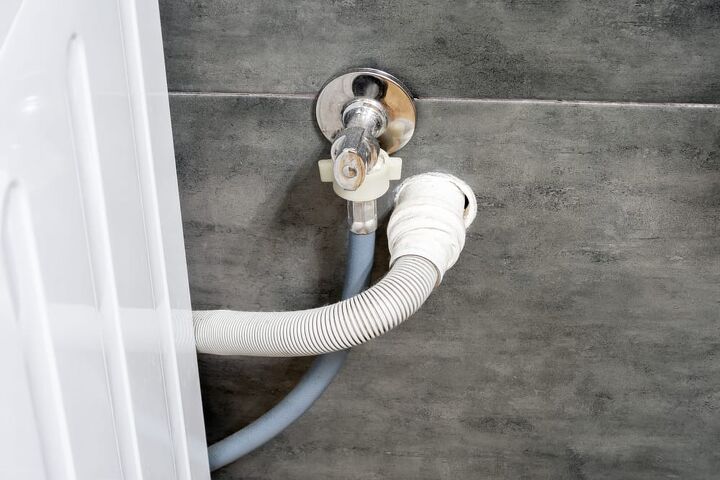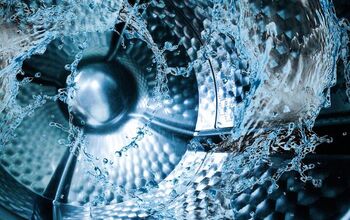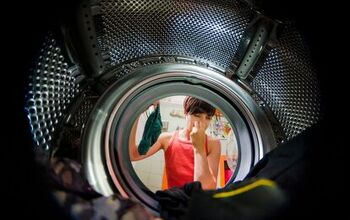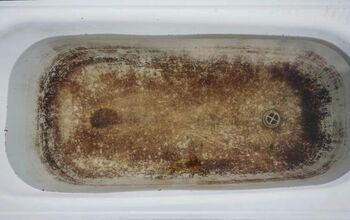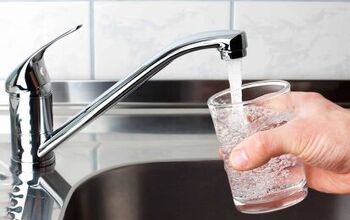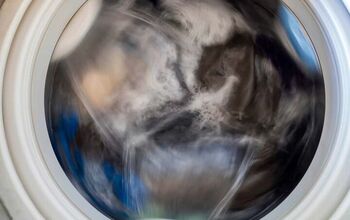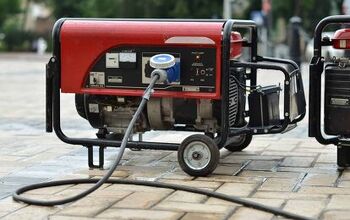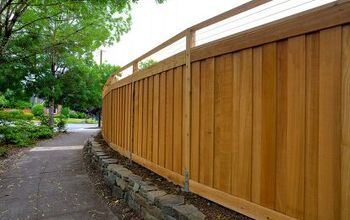How To Run Washing Machine Drain Outside (Do This!)

It’s no secret that washing machines use a lot of water, and that dirty water has a need to be drained somewhere. If you have “city plumbing,” this isn’t a problem. If you have a septic tank, it doesn’t make sense to put all that washing machine water in your tank. You can just run a washing machine drain outside. Doing this, though, can be a little hard to do.
The basic solution for running a washing machine drain outside is to replace the drainage pipe with one that leads to your backyard. From there, you can choose to connect the piping to the irrigation network that you use to water your backyard or add it to a greywater tank.
Running a washing machine drain outside is a grey area in a lot of ways. If you want to give this a try, there’s a lot that you will need to be aware of. This guide will give you a better idea of what to expect, and let you make your own conclusions.
Related Content: Washing Machine Drain Overflows By Wall | Washing Machine Not Draining Completely? | How Much Water Does A Washing Machine Use?
Do You Need to Hire a Plumber?
Get free, zero-commitment quotes from pro contractors near you.

Is This Safe For Your Yard?
This all depends on what you’re using as detergent, as well as what you mean by “washing machine.” If you’re discussing a machine that washes laundry, then it could be safe. If it’s a machine that washes dishes, then it’s not.
Laundry water is considered to be “greywater” which means that it is minimally damaging for your yard. As long as you use environmentally-friendly, biodegradable detergents, you shouldn’t have a problem with using laundry water in irrigation. On the other hand, dish detergent is too caustic for most plant life. This, in turn, makes it dangerous to do.
What Should You Be Aware Of When Watering Your Lawn With Greywater?
Greywater is water that has been used for one purpose, then is repurposed for use in lawncare or irrigation. If you want to use greywater in your yard, there are several things you need to know:
- Detergents with phosphorous are great for plants, but sodium is not. Low sodium, moderate phosphorous detergents are ideal.
- If you regularly launder diapers or other items with feces, do not use it to irrigate your lawn. This water contains pathogens that can get you sick. It’s a serious health risk. It’s like trying to water your plants using water seeping out of your septic tank.
- Do not use bleach in laundry that will be used to water your plants. It’ll kill the plants. The same can be said about detergents featuring chemical compounds like borax.
- Keep your plumbing safe from clogs. Do not try to throw ingredients or items in the wash that could contribute to clogs forming in your plumbing. If your washing machine won’t drain, you’ll have a huge problem on your hands.
Will Greywater Harm Your Yard?
While you do have to be careful about the kind of detergent you use and the clothing types you wash, you should be alright with watering your yard with greywater in most cases. Plant life is sensitive, but not that sensitive. At least, in most cases. You can usually use this water to give trees and shrubs
If you have specialized plants that are sensitive to additives (like venus fly traps), then you may have to avoid watering your lawn. Specialty flowers do not fare well with greywater.
Is This Even Feasible?
Recycling your water is something that shouldn’t be taken lightly. This is not always a doable endeavor, even if you want to make sure that you’re going as green as possible. Any of the following circumstances are clear indicators that you may need to rethink your plans:
- The potential path of the water would run off into a neighbor’s yard. C’mon. Don’t be that person. You wouldn’t want them throwing water into your lawn, why would you do that to them? Besides, it might actually be grounds for a lawsuit or a municipal code violation, too.
- Most systems will not work if you’re trying to irrigate uphill. The laundry sump pump won’t have enough power to push water uphill. It usually has just enough to bring the water from a basement up to the ground floor.
- Avoid using greywater in any area where runoff could enter bodies of water. While the greywater won’t hurt plants, it absolutely can hurt fish and frogs. This also can be a violation of land use codes or building codes, depending on where you live and the situation involved.
- You use way too much water for it to be healthy for your yard. If you have a tiny yard but use your washing machine three times a day, you probably will end up overwatering your lawn. While you might want to work with your greywater, you don’t want to wreck your lawn.
Is This Actually Legal?
The legality of using greywater is something that is a “legal grey area,” too. This all depends on the regulations in and around your neighborhood. Before you start hooking up your piping, it’s important to check out what your local HOA, land ordinances, and regulatory boards say. If your land is in deregulated areas, it’s safe to say that you can do it.
Many areas, including several counties in California, require people reusing their water to install sump pits—gravel-filled pits that help filter out any of the debris that could have been in the laundry water. (This is true, even though some people Make sure that you check your local laws before you start working on this project.
How To Drain Your Washing Machine Outside
Due to the fact that each washing machine’s plumbing setup will be different, and because there are some rules you might have to abide by that we don’t know about, we are just going to give generic instructions. To get the best results, tailor it to your needs. Here’s what you will need to do.
- Make a plan. The first thing you want to do is figure out where you want to drain the washing machine. You can drain it to a barrel (where you can water your lawn in smaller bursts later using a watering can), to your irrigation system, or just drop a hose outside. If you choose to get a barrel, prepare to have one that can fit at least 41 gallons since that’s the average water load a washer makes.
- Gather supplies that work with your plan. If you want to drain the laundry water from a basement to the ground floor, you will need a laundry sump pump to push the water upwards. If you want to drain it to a barrel, you will need a barrel. You get the point. Regardless of what your plan is, you will need a 1-inch hose that you can funnel the water through as well as all the tubing.
- Cut the current drain tube and connect your new tubing to the open end. Then, run your tubing through your drainage system. Whether that includes a pump, a sump pit, or an irrigation channel is up to you.
- Make sure everything is watertight and functional before you turn your washing machine on. This is a must.
Should You Call A Professional?
In most cases, the answer is no. If you’re just rerouting the piping into a large barrel, you do not need a handyman to do that. On the other hand, if you need to install a sump pit, have a very detailed irrigation circuit that involves burying pipes underneath dirt, or have a lot of building codes, things change pretty fast.
If you aren’t sure whether or not you need a professional, you can always err on the safe side. With that said, cutting a pipe and replacing it with a hose that leads to wherever you want it to lead isn’t that hard a project in the eyes of most others.
Do You Need to Hire a Plumber?
Get free, zero-commitment quotes from pro contractors near you.

Related Questions
What is blackwater waste?
Blackwater is a sanitation term that relates to water that has been contaminated with content that you might find in a toilet. This could include feces, urine, toilet paper, and other similar biologically-tainted waste. Due to the nature of this waste, blackwater is considered to be a health hazard and heavy in pathogens.You cannot use blackwater for watering purposes or cleaning purposes without processing it for treatment first. It is considered to be extremely unsafe to handle otherwise.
What is the difference between greywater and blackwater?
Greywater is water that came from showers, bathtub drains, and bath sinks. This is water that is tainted, but can be lightly treated in order to become usable as a source of water for lawns, crops, and similar works. Greywater might have soap and some light bacteria, but it will not have things like vomit, feces, or toilet paper.
Can you dump greywater on the ground?
Yes. Since greywater is gently used and does not involve the dangerous pathogens that come into contact with toilets, it’s perfectly fine if you dump it on the ground. However, your HOA might not approve of doing this, so it’s still a good idea to check.
Related Guides

Ossiana Tepfenhart is an expert writer, focusing on interior design and general home tips. Writing is her life, and it's what she does best. Her interests include art and real estate investments.
More by Ossiana Tepfenhart



